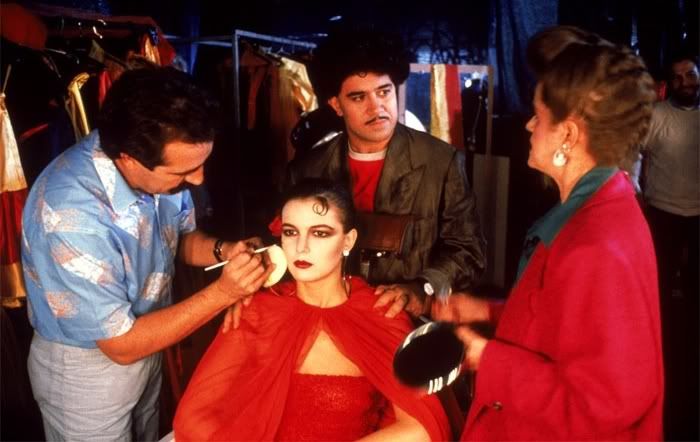Viva Pedro: Matador

by Ryland Walker Knight
Sony Pictures Classics is earning mega points this fall by touring 8 new prints of 8 of Pedro Almodóvar's finest films. This unlucky guy only got to see one, MATADOR, but boy was it fun. Released in Spain in 1986 it is the earliest of the series despite its American release two years later in '88. Many critics have bemoaned Pedro for classing it up and going mainstream with a few movies about trannies, pedophilia, necrophilia, HIV-positive nuns finding out they're pregnant and plenty of sweaty gay sex. They've said he's tamed himself, and that's true, to an extent, but the major difference I can see between his 80s films and this recent string of excellence is his writing has matured. The 80s films are all just as lively and colorful yet their characters are not as fully formed: he's developed an uncanny ability to turn a melodramatic archetype into a poignant character study. In MATADOR, for example, we have all the familiar caricatures but none of the emotional depth found in, say, TALK TO HER.
Antonio Banderas plays Angel, a naive young man eager to rebel against his Opus Dei mother (a hilariously oblivious Julieta Serrano) and become a bullfighter because, he says, he is "drawn to danger." He takes classes from Diego (Nacho Martinez), a matador forced into retirement after a brutal goring limited his mobility. When Diego asks Angel if he is homosexual, Angel explodes and declares he'll prove he's not gay. Later that evening he attempts to rape his next door neighbor Eva (Eva Cobo), who also happens to be Diego's girlfriend. However, it's all wrong: Angel can't open his Swiss Army knife to threaten Eva and can't pull her panties down before prematurely ejaculating between her legs. A thunderstorm begins as Angel slides off Eva and apologizes. Eva stands up, straightens herself and slaps him. Turning to go, she trips and falls to the ground, cutting her temple. At the sight of blood, Angel faints, alone in the rain.
Here, the scene is the blackest humor, nearly slapstick, all nerves and pratfalls but one imagines the scene might play earnest in a later film; in TALK TO HER we're horrified when Benigno rapes the comatose Alicia. Risk and consequence are very much at play in MATADOR nevertheless. According to Diego, "not to kill is to die" for him now that he has been forced to leave the ring. Diego finds a kindred spirit in Maria (Assumpta Serna) who, fascinated by matadors--and Diego in particular it seems--has been seducing men and killing them during sex with a deadly hairpin to the back of the neck. She also happens to be Angel's lawyer once he impulsively confesses to her murders as well as two others strangely linked to him through his class under Diego.
With all the coincidences piling up, it would be easy to dismiss the writing as a series of cheap, fortuitous devices were it not for Almodóvar's direction and the great acting by his cast until he takes it one step further than I had expected. That's where he genius lies, I think: finding that line to step over and leap across. It's a tricky proposition that many directors fail at (the most recent example is DePalma's BLACK DAHLIA) but Almodóvar's heedless love of movies and expert melodrama raises his pulp to art.
Being a relative neophytic world cinema fan (I discovered Pedro just prior to TALK TO HER's stateside release), it's a wonder to slowly discover all the foreign sources many successful American directors steal from and remember they, too, were borrowing and re-inventing American movies that came before them. Almodóvar tips his hand when Diego and Maria meet in a movie theatre at the climax of King Vidor's DUEL IN THE SUN, wherein Jennifer Jones and Gregory Peck kill each other, and all four characters on screen are smiling. And despite the depravity onscreen throughout any of Pedro's films I always find myself joining him, celebrating all things cinematic and beautiful. I don't think MATADOR can compete with his later, "tamer" movies on an emotional level but as far as sheer entertainment goes, you won't be disappointed by any of the plot's unlikely and abrupt twists and turns and stabs in every direction imaginable but impossible to predict. Except that last one.
(Check out the sweet stache on Pedro, flanked by Eva Cobo & Chus Lampreave, plus make up dude)
01986: 110 minutes: dir. Pedro Almodóvar: written by Almodóvar & Jesús Ferrero




This film is perfect, actually it's a classic, that's what I like specially when it is managed by an amazing director, besides the back stage was something really relevant for the film.m10m
ReplyDeleteWith all the coincidences piling up, it would be easy to dismiss the writing as a series of cheap, fortuitous devices were it not for Almodóvar's direction and the great acting by his cast until he takes it one step further than I had expected.
ReplyDelete